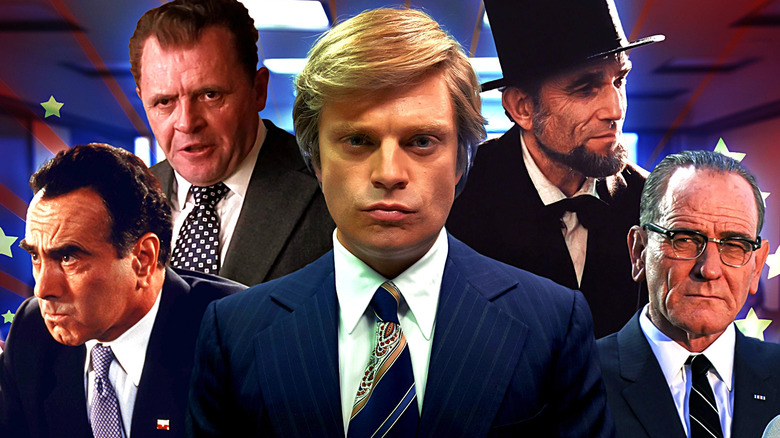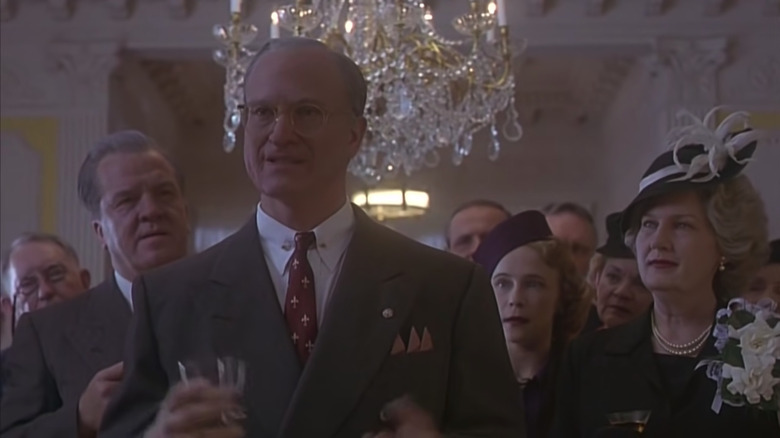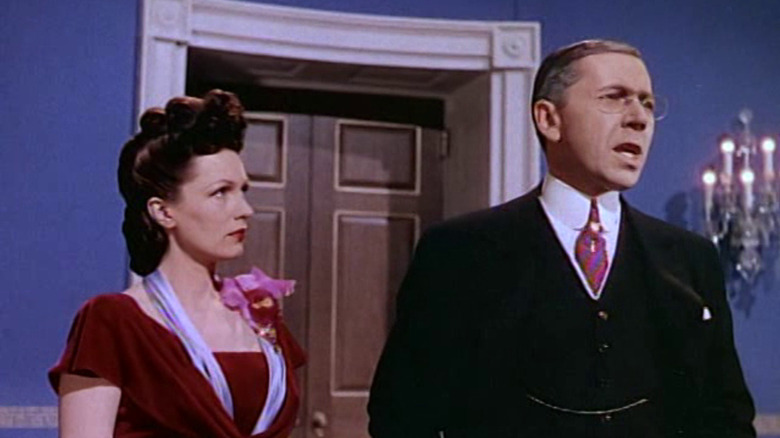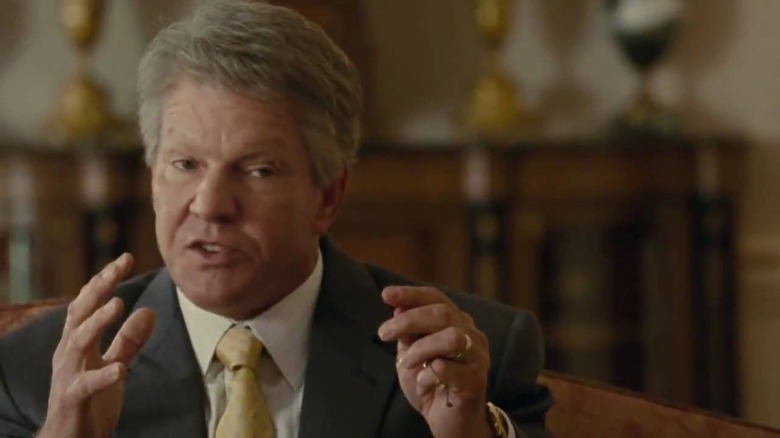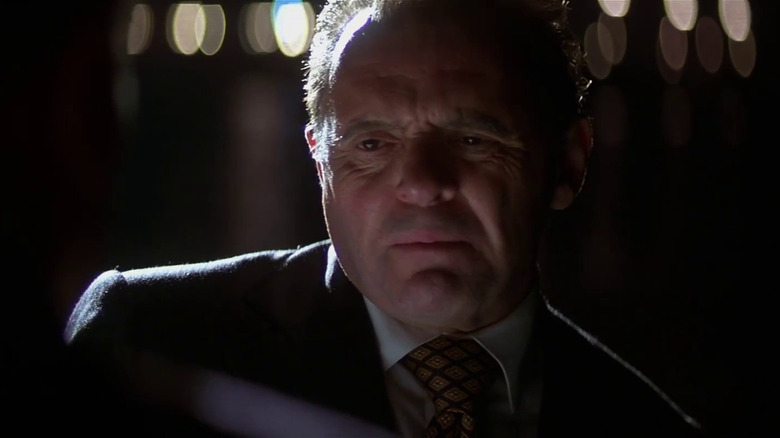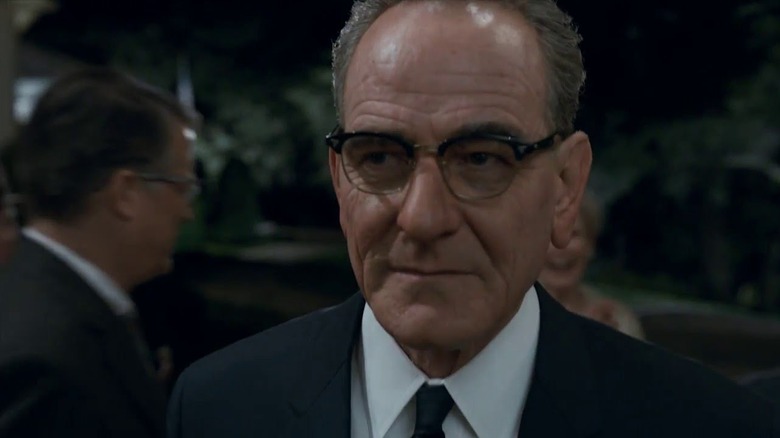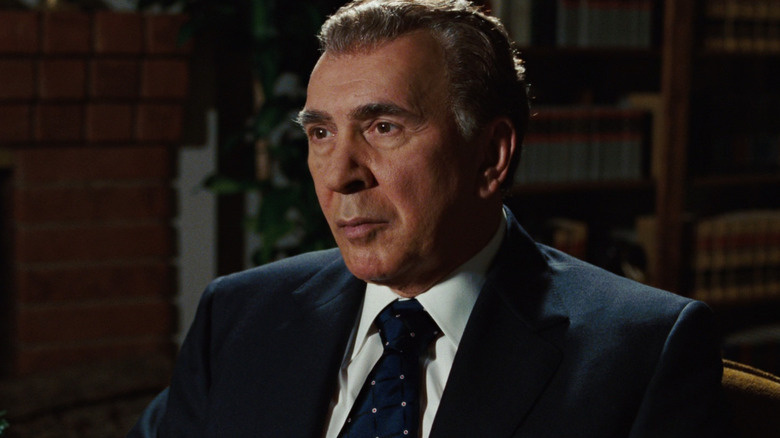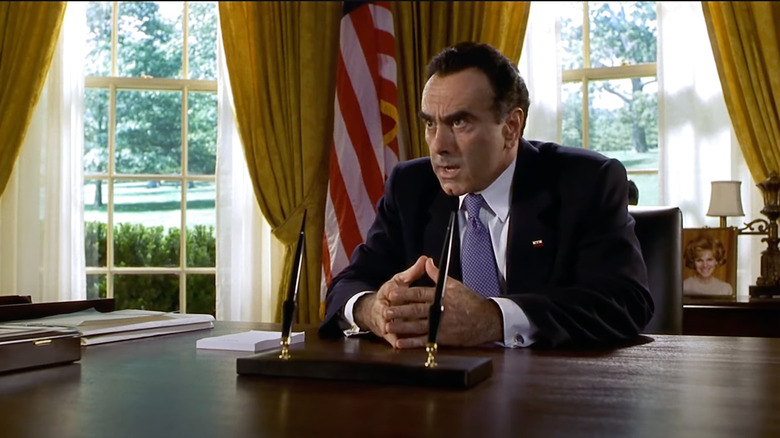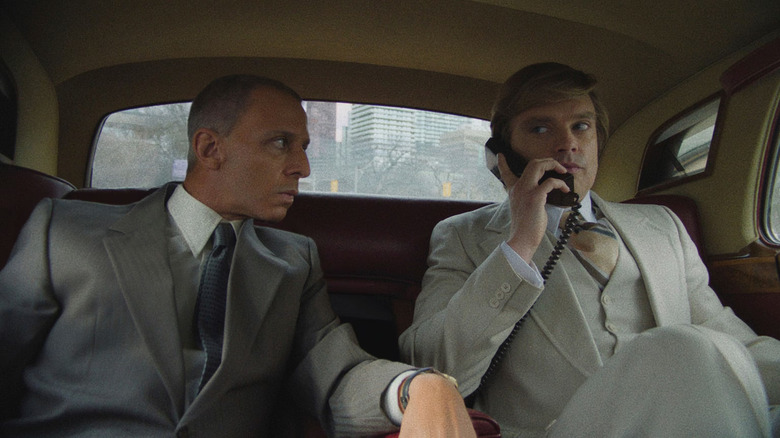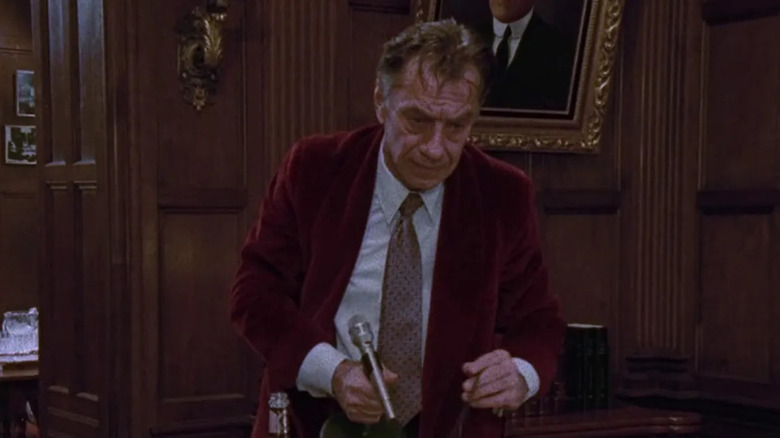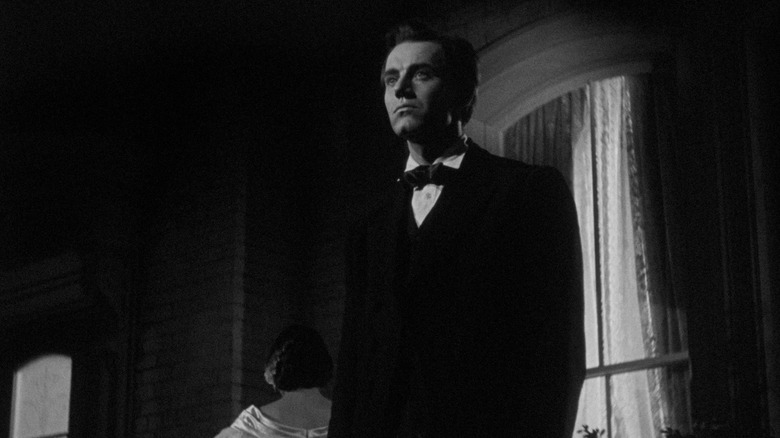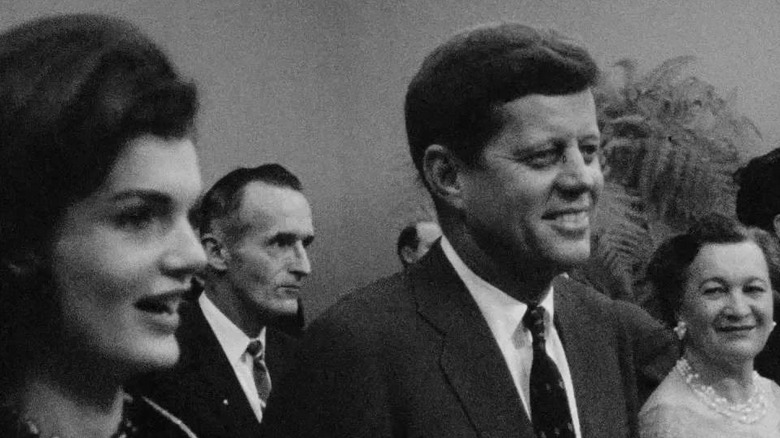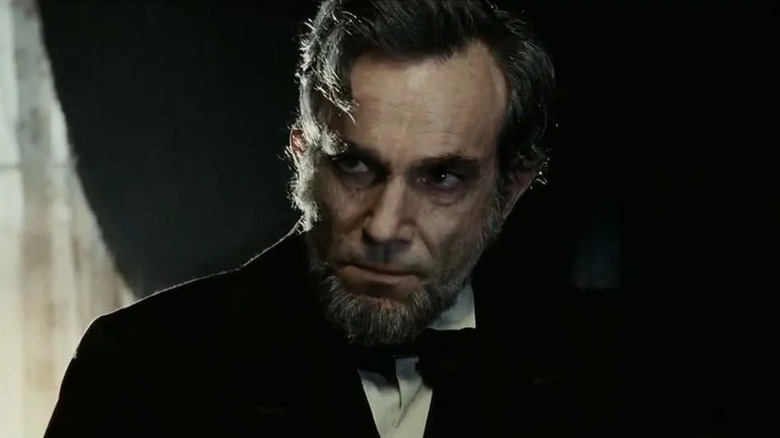The 12 Best Movies About Presidents, Ranked
What does it mean to be the President of the United States? Are you the leader of the free world, the responsible holder of the highest status in the land, a role model to one and all? Or are you a power-hungry despot, a selfish apex of broken ideals of exceptionalism and imperialism? Or is it somewhere in between? Or does it change from person to person?
These are big questions for a big office, questions that have been explored in various movies throughout the years. While there are a litany of interesting movie presidents in bangers like "Dave," "Idiocracy," and "Fail Safe," some of our most direct interrogations have come when filmmakers and performers set their sights on the real-life rulers, donning prosthetics and turning history into drama.
So turn in your ballots and enroll in those electoral colleges. These are the 12 best movies about presidents, ranked. Some of them criticize, some of them honor, and all of them reflect a different side of the complicated position of government.
12. Truman
Based on a Pulitzer Prize-winning biography of the man, "Truman" stars blockbuster character actor Gary Sinise as President Harry S. Truman. The 1995 film, directed by Frank Pierson (the 1976 version of "A Star Is Born"), takes us through all of the most known and notorious moments of Truman's presidential life, including the famous "Dewey Defeats Truman" headline, the horrors of World War II, and the gutting decision to drop the atomic bomb on Japan.
If you saw Christopher Nolan's "Oppenheimer," you saw Gary Oldman briefly play President Truman as, charitably, a gloating ghoul. He dismisses J. Robert Oppenheimer's concerns about the devastation caused, sarcastically waves a handkerchief in his face, and even calls him a "crybaby" when he leaves.
Sinise has, obviously, much more room to play President Truman, but there remains an interesting level of criticism in his take. I've always felt Sinise is wonderful at playing characters who seem professional on the surface but have a barely hidden, sinister edge, and this image curdles at the corner even during some of the "just the facts" historical dryness of the screenplay. It makes for quite an interesting watch.
11. Wilson
1944's "Wilson" takes the life of President Woodrow Wilson and elevates it to an epic, Technicolor spectacle, a feat of classical Hollywood filmmaking. Alexander Knox was nominated for an Oscar for his portrayal of Wilson, guiding us through the man's life from college to the end of his second term. The loss of his wife, the marriage of another one, the American involvement in World War I, the fractured identity of the Democratic party — all of this is guided spectacularly by prolific director Henry King, also nominated for an Oscar.
If you tend to get bored by old, languidly paced Hollywood movies, and if you tend to turn down something like "Gone With the Wind," "Wilson" will not work for you. But those who appreciate and enjoy the craft of this era of filmmaking will find much to dig into in "Wilson."
Beyond the brouhaha of it all, "Wilson" has a surprisingly frank screenplay, willing to dig into some of the complications of the man, including his feelings of failure and regret throughout his presidency.
10. The Special Relationship
No, it's not a presidential romcom. Or is it?
"The Special Relationship" refers to one between the U.K. Prime Minister Tony Blair (Michael Sheen, whom we'll see later) and U.S. President Bill Clinton (Dennis Quaid). While tightly paced, the film covers a lot of vital 1990s history, from the rebuilding of Blair's Labour Party to the Kosovo War to Clinton's sex scandal with intern Monica Lewinsky.
It thankfully does this all with a lighter, even gently comedic tone; these two guys really do seem to get along with each other, giving the film a fascinating humanism not present in other, more traditional presidential biopics. When the film takes its darker turns, especially when Clinton suffers through his scandal, you feel the impact on an intimate level.
This is actually the third time screenwriter Peter Morgan (creator of "The Crown," who sometimes bends the truth for drama) and actor Sheen collaborated on a Tony Blair-centered work, and the only time the two brought U.S. politics into the mix. As Clinton, Quaid brings a lightly metatextual flavor of "I'm a guest who doesn't quite belong," using the former president's Southern charm to try and hide some unsavory circumstances.
9. Nixon
President Richard Nixon had a volatile run in the office, to say the least. He was accused of corruption at every turn, blowing up spectacularly with the Watergate scandal, in which members of Nixon's reelection campaign broke into the DNC's headquarters and implanted listening devices. Nixon resigned before facing impeachment, and his historical fate was sealed.
All of this high drama is catnip to any storyteller, making President Nixon one of the most "filmed about" American presidents. And in 1995, Oliver Stone (who previously made the presidential conspiracy thriller "JFK") took a crack at the plate, casting Sir Anthony Hopkins as "Nixon" and fashioning a three-hour epic trying to make sense of it all.
The film uses Nixon's many surreptitious tapes, both in Watergate and the Oval Office itself, as framing devices, triggering flashbacks that detail his career and try to figure out the "why." Stone is a talented but not particularly subtle filmmaker, and Hopkins is not a particularly subtle actor; as such, the film has a flair for the operatic. It's a subsuming ride of a watch, an attempt to turn a president into a figure of Shakespearean tragedy. Sometimes, the film's reach exceeds its grasp, but it's never not engrossing.
8. All the Way
"All the Way" is based on a play and helmed for the screen by Jay Roach, who is sort of the proto-Adam McKay, moving from goofy stuff like "Austin Powers" to a slate of nervy dramas based on true stories. Bryan Cranston stars as President Lyndon B. Johnson, who ascended to the office under tragic circumstances – the assassination of President John F. Kennedy.
The film details this sudden rise to power with uncommon grit, showing the boots-on-the-ground warfare it took to get something as noble as the Civil Rights Act passed. It also shows that Johnson isn't messing around in any of his relationships with notable figures like Martin Luther King Jr. (Anthony Mackie) and J. Edgar Hoover (Stephen Root).
I admire how much "All the Way" avoids romanticism, instead placing its characters against each other in explosive scenes of conflicting desire (as any good piece of theatre should). It paints being the president as a job no sane person would ever want, and its final monologue on the burden of power feels like any president could have given it — maybe even Richard Nixon a few years later.
7. Frost/Nixon
For those keeping score: This is Nixon No. 2, Michael Sheen No. 2, and Peter Morgan No. 2!
"Frost/Nixon," also based on a play, comes from the sturdy directorial hand of Ron Howard, who cranks up his sometimes milquetoast style into something approaching a suspense thriller, much to the film's benefit. Sheen stars as David Frost, a fluffy talk show host who wants to pivot back into hard journalism by interviewing former president Richard Nixon, played here by Frank Langella. The two spar in their televised interviews as Frost tries to get at the truth and Nixon tries to explain himself with any sort of dignity.
The film says a lot about the conflicting complexities of public identities versus private desires. Nixon is depicted with empathy, but Langella is too smart an actor (and we know too much about the real Nixon) to ever let us know whether his more vulnerable moments are completely genuine. It's a keen psychological profile of the former president based on a fascinating, true moment in television history.
6. Dick
And now: Nixon No. 3. But this time, like some critics might say about his time in office, it's a pure, absurdist comedy. "Dick" stars a young Kirsten Dunst and Michelle Williams as two teenage girls who live in Washington, D.C. and accidentally break the Watergate scandal, catching G. Gordon Liddy (Harry Shearer) in the act.
As a result, the two effectively become what we know as "Deep Throat," the anonymous source who broke the Watergate story to Washington Post reporters Bob Woodward and Carl Bernstein (played here by Will Ferrell and Bruce McCulloch). And one guy who really doesn't like this is President Richard Nixon, played with single-minded hilarity by Dan Hedaya.
Beyond being a hysterical, alt-comedy take on journalistic masterpiece "All the President's Men," "Dick" delivers one of the best portrayals of a corrupt president, making a statement more traditionally "serious" biopics could never. If Nixon's M.O. was "power by any means necessary," there's no more effective way to show that than by watching him use national authority to terrorize two silly, teenage girls. It's a boxing glove of a movie hidden behind a daisy.
5. The Apprentice
Who wants to watch a movie about President Donald Trump? He's been a public figure for his entire life, and he's so pervasively megalomaniacal, so transparently pursuing power and corruption, that it's hard to imagine any kind of fictional take delivering any kind of realization about the man.
I'm glad I put these thoughts aside and watched Ali Abbasi's "The Apprentice," because it's a stunning work of psychological surgery, his very own Darth Vader origin story. The film frames Trump (a revelatory Sebastian Stan) as the titular apprentice, learning how to accrue power and use people from notorious fixer Roy Cohn (a frightening Jeremy Strong).
Much to its benefit, the film never really charts the course toward "President Donald Trump," instead giving us a rich, inventively filmed tapestry of this specific cultural moment and showing us what happens when a fundamentally broken man is picked up and mentored by another fundamentally broken man. It's funny, tragic, at times horrifying, and a pretty definitive piece of art in our loud and clanging Trump era.
4. Secret Honor
Finally, we end with Nixon No. 4, easily the most experimental and pulverizing of the studies of this spurned ex-president.
Robert Altman is a master of directing actors, though he typically works with a big ensemble, letting them bounce off and overlap each other. In "Secret Honor," he's only got one actor: the brilliant Philip Baker Hall, playing President Richard Nixon like some unholy combination of Henry Hill in "Goodfellas" with The Incredible Hulk.
The script, adapted from a play, finds Nixon musing wildly about his life and controversial career, attempting to find any rationality among the madness. Oh, yeah, and he's got a loaded gun ready to turn on himself at any moment.
"Secret Honor" is a presidential drama as a psychological horror movie. It feels dangerous and unsafe, especially in its bald-faced willingness to draw huge, human reasons why Nixon sought power above all else. And Altman makes some startling formal decisions, too; its ending moments, using a cavalcade of television sets, cross the line from realism into melodrama in a way I'll remember for the rest of my life.
3. Young Mr. Lincoln
Alright: let's take a deep breath and actually honor one of these presidents, huh? "Young Mr. Lincoln" comes from two American film masters, director John Ford, who had to force his star, Henry Fonda, to say yes to the movie. Fonda plays Abraham Lincoln in his, well, young years, a time when he discovers the law, meets Mary Todd (Marjorie Weaver), and defends a murder trial with honor, dignity, and conviction.
The 1939 film is almost nakedly uninterested in a complex scrutiny of young Mr. Lincoln. Instead, it presents him as a paragon of virtue, a man able to talk reason into an uncontrolled mob, captivate anyone who sees him, and determine the truth kindly but firmly. These are all features, not bugs, of the movie. If your tastes lean toward Frank Capra or even Aaron Sorkin-esque dialogue-driven dramas that believe in the inherent goodness of man, "Young Mr. Lincoln" will play like a glass of water on a hot day.
Plus, its focus on Lincoln's pre-presidential years makes it just as much of a straight-up legal drama as a study of the man who'd be our 16th, a neat way to structure a film actively and conclusively.
2. Primary
"Primary" is a revelatory 1960 documentary from some of the most influential filmmakers in the form, including Robert Drew ("Crisis"), D. A. Pennebaker ("The War Room"), and Albert Maysles (the crumbling, gothic curiosity of "Grey Gardens"). The film uses the burgeoning techniques of "direct cinema" to show Wisconsin's 1960 Democratic primary election. It focuses on the two main candidates: Senator Hubert Humphrey and the man who'd become our 35th President, John F. Kennedy.
Direct cinema favors lightweight, unobtrusive equipment and a goal of no authorial intervention. No talking head interviews, no redirects from behind the camera, and seemingly no point of view from the filmmakers at all. "Primary" aims to point a camera at Kennedy and let him exist.
To this day, this provides a startling effect, even and especially in an era of unprecedented access to politicians' public lives. Kennedy was our first television president, and it's fascinating to watch him acquaint himself with these documentary cameras, able to quickly "be authentic" no matter who's around him. Though it does beg an itching question: is he really being "authentic"? Or do you have to shed a version of yourself to be such a public, powerful figure? "Primary" provides no answers, only raw, immediate information.
1. Lincoln
In 2012, Academy Award winners Steven Spielberg and Daniel Day-Lewis collaborated with Pulitzer Prize-winning writer Tony Kushner to deliver the definitive American presidential drama in "Lincoln."
Day-Lewis stars as Abraham Lincoln during a pivotal time in his tenure, winning a third Academy Award in the process. In the film, the Civil War is coming to an end, and the President wants to ensure the illegality of slavery is codified into federal law with a proposed 13th Amendment. Thus, the majority of the film's dramatic engine comes from Lincoln and a crew of advisors, including exceptional supporting turns from James Spader and Tommy Lee Jones, doing everything in their power to make sure this dang Amendment gets passed.
Kushner's dramatic spine is an excellent one; despite Spielberg's typically handsome frames and Day-Lewis' dignity in the role, "Lincoln" never feels boring because its characters are always in motion, always clearly wanting something. It thus shows, more than any other film on this list, the true day-to-day grind of being an American president during a particularly pivotal time of history. Tellingly, and helpfully, Spielberg never once considered "Lincoln" a traditional "biopic."
It's a gripping, moving, and often genuinely funny picture, one that reminds you of the best version of an American politician by having him behave however he needs to do the right thing.
